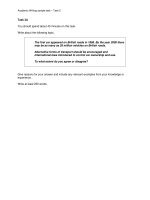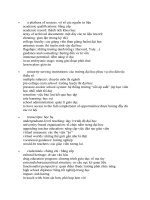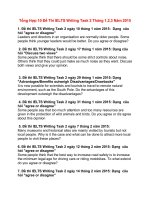Model writing 8.5 8899 banning mobiles in certain places
Bạn đang xem bản rút gọn của tài liệu. Xem và tải ngay bản đầy đủ của tài liệu tại đây (173.32 KB, 10 trang )
Overall band score
See below C&C LR GRA
8.5
8+8+9+9
Model answer
WRITING TASK 2
You should spend about 40 minutes on this task.
Write about the following topic.
The use of mobile phones is as antisocial as smoking. Smoking is banned in
certain places so mobile phones should be banned like smoking.
To what extent do you agree or disagree?
Give reasons for your answer and include any relevant examples from your own
knowledge or experience.
Write at least 250 words.
Original answer Some claim that the use of mobile phones in public places is as antisocial as
smoking, suggesting a parallel between the two. They posit that just as smoking
has been banned in specific areas, mobile phone use should face similar
restrictions. I would argue against this proposal, despite acknowledging the
reasons underpinning it.
At first glance, the argument equating the antisocial nature of mobile phone use
to smoking seems compelling. Individuals engrossed in their screens can often
appear detached from their immediate surroundings, much like smokers
engrossed in their cigarettes. Also, a person having a loud phone conversation in a
quiet café can disrupt the peace, akin to smoke drifting over to a non-smoker's
table.
However, it should be noted that while smoking has direct health implications for
both the smoker and those exposed to second-hand smoke, mobile phone use
does not inherently harm others physically. The primary concerns with smoking
are its tangible health risks, leading to its prohibition in enclosed public spaces.
Mobile phone use, in contrast, does not carry such direct and universally
acknowledged hazards.
Furthermore, mobile phones have evolved into indispensable tools for
communication, navigation, and even emergency situations. Banning them in the
same way as smoking would inevitably hinder essential and sometimes life-saving
functionalities. For instance, one might need to make an emergency call or
receive crucial information at any given moment.
Rather than imposing a ban, I believe promoting responsible mobile phone use is
a more sensible course of action. By teaching the value of mindful usage, such as
setting time limits, prioritizing face-to-face interactions, and minimizing
distractions, we can strike a balance between harnessing the advantages of this
technological device and maintaining healthy real-world connections.
In conclusion, while the antisocial parallels drawn between mobile phone usage
and smoking have some merit, the nature of their respective inconveniences is
fundamentally different. Smoking poses a clear health risk to the public, whereas
mobile phone use, if done respectfully, does not. For this reason, I would contend
that an outright ban akin to smoking would be disproportionate and that
guidelines on phone etiquette is a more practical solution.
Overall band score
8.5
8+8+9+9
TR – Task Response nb – GRA and LR errors have not been corrected
Band score 8
The use of mobile phones [a]is as antisocial as smoking. Smoking is banned in
certain places so mobile phones should be banned like smoking.
To what extent do you agree or disagree?
I’d say it’s unsociable to be glued to your mobile in the company of others, as is
now almost universal, especially among young people. The question is
about antisocial behaviour, rather than being unsocial. Shouting into your
mobile, oblivious to the discomfort of others is definitely antisocial.
Is the question really about banning the use of mobiles, or is it about banning
people from making loud phone calls? Whatever the intention of the question,
I’d focus about the latter, and obviously exceptions can be made for emergencies,
and using them for navigation or regular internet surfing / entertainment, and
text messaging would not be affected.
Even so, a law prohibiting mobile calls seems draconian and impossible to enforce
– which would be another good reason to argue against.
You have a clear position throughout and all parts of the question are addressed.
Your position is coherent and well-argued.
The ideas are relevant, extended and there are no contradictions.
Some claim that the use of mobile phones in public places is as antisocial as
smoking, suggesting a parallel between the two. They posit that just as smoking
has been banned in specific areas, mobile phone use should face similar
restrictions. I would argue against this proposal, despite acknowledging the
reasons underpinning it. [b]
At first glance, the argument equating the antisocial nature of mobile phone use
to smoking seems compelling[c]. Individuals engrossed in their screens can often
appear detached from their immediate surroundings, much like smokers
engrossed in their cigarettes[d]. Also, a person having a loud phone conversation in
a quiet café can disrupt the peace, akin to smoke drifting over to a non-smoker's
table. [e]
However, it should be noted that while smoking has direct health implications for
both the smoker and those exposed to second-hand smoke, mobile phone use
does not inherently harm others physically. [f]The primary concerns with smoking
are its tangible health risks, leading to its prohibition in enclosed public spaces.
Mobile phone use, in contrast, does not carry such direct and universally
acknowledged hazards.[g]
Furthermore, mobile phones have evolved into indispensable tools for
communication, [h]navigation[i], and even emergency situations. Banning them in
the same way as smoking would inevitably hinder essential and sometimes lifesaving functionalities. For instance, one might need to make an emergency call or
receive crucial information at any given moment.[j]
Rather than imposing a ban, I believe promoting responsible mobile phone use is
a more sensible course of action. [k]By teaching the value of mindful usage, such as
setting time limits, prioritizing face-to-face interactions, and minimizing
distractions, we can strike a balance between harnessing the advantages of this
technological device and maintaining healthy real-world connections. [l]
In conclusion, while the antisocial parallels drawn between mobile phone usage
and smoking have some merit, the nature of their respective inconveniences is
fundamentally different. Smoking poses a clear health risk to the public, whereas
mobile phone use, if done respectfully, does not. For this reason, I would contend
that an outright ban akin to smoking would be disproportionate and that
guidelines on phone etiquette is a more practical solution.[m]
C&C - Cohesion and Coherence nb GRA and LR errors have not been corrected
Band score 8
I don’t see the point of writing 4 main body paragraphs – it inevitably leads to an
answer that’s longer than necessary, and there’s repetition, especially in the one
about health. I’d combine the first two and the second two, making 2 main
bodies.
Nevertheless, it could be a valid technique, and there are many ways to bet a high
score. However, I’d always go for orthodoxy.
The organisation is excellent and easy to follow.
The paragraphs have a natural flow of ideas and clear central topics. Use of
cohesive devices and referencing is excellent throughout.
The paragraphs have a natural flow which is characteristic of high band
score answers.
Some claim that the use of mobile phones in public places is as antisocial as
smoking, suggesting a parallel between the two. They posit that just as smoking
has been banned in specific areas, mobile phone use should face similar
restrictions. I would argue against this proposal, despite acknowledging the
reasons underpinning it.
At first glance, the argument equating the antisocial nature of mobile phone use
to smoking seems compelling[n]. Individuals engrossed in their screens can often
appear detached from their immediate surroundings, much like smokers
engrossed in their cigarettes. Also, a person having a loud phone conversation in a
quiet café can disrupt the peace, akin to smoke drifting over to a non-smoker's
table.
However, it should be noted that while smoking has direct health implications for
both the smoker and those exposed to second-hand smoke, mobile phone use
does not inherently harm others physically. [o] The primary concerns with smoking
are its tangible health risks, leading to its prohibition in enclosed public spaces.
Mobile phone use, in contrast, does not carry such direct and universally
acknowledged hazards.[p]
Furthermore, mobile phones have evolved into indispensable tools for
communication, navigation, and even emergency situations. [q]Banning them in
the same way as smoking would inevitably hinder essential and sometimes lifesaving functionalities. For instance, one might need to make an emergency call or
receive crucial information at any given moment.
Rather than imposing a ban, I believe promoting responsible mobile phone use is
a more sensible course of action.[r] By teaching the value of mindful usage, such as
setting time limits, prioritizing face-to-face interactions, and minimizing
distractions, we can strike a balance between harnessing the advantages of this
technological device and maintaining healthy real-world connections. [s]
In conclusion, while the antisocial parallels drawn between mobile phone usage
and smoking have some merit, the nature of their respective inconveniences is
fundamentally different. Smoking poses a clear health risk to the public, whereas
mobile phone use, if done respectfully, does not. For this reason, I would contend
that an outright ban akin to smoking would be disproportionate and that
guidelines on phone etiquette is a more practical solution.
LR- - Lexical resource nb Some GRA errors have not been corrected
Band score 9
Vocabulary is used accurately with sufficient flexibility to show precise meaning,
with a wide variety of vocabulary, used accurately and with a high level of control.
Some claim that the use of mobile phones in public places is as antisocial as
smoking, suggesting a parallel between the two. They posit that just as smoking
has been banned in specific areas, mobile phone use should face similar
restrictions. I would argue against this proposal, despite acknowledging the
reasons underpinning it.
At first glance, the argument equating the antisocial nature of mobile phone use
to smoking seems compelling. Individuals engrossed in their screens can often
appear detached from their immediate surroundings, much like smokers
engrossed in their cigarettes. Also, a person having a loud phone conversation in a
quiet café can disrupt the peace, akin to smoke drifting over to a non-smoker's
table.
However, it should be noted that while smoking has direct health implications for
both the smoker and those exposed to second-hand smoke, mobile phone use
does not inherently harm others physically. The primary concerns with smoking
are its tangible health risks, leading to its prohibition in enclosed public spaces.
Mobile phone use, in contrast, does not carry such direct and universally
acknowledged hazards.
Furthermore, mobile phones have evolved into indispensable tools for
communication, navigation, and even emergency situations. Banning them in the
same way as smoking would inevitably hinder essential and sometimes life-saving
functionalities. For instance, one might need to make an emergency call or
receive crucial information at any given moment.
Rather than imposing a ban, I believe promoting responsible mobile phone use is
a more sensible course of action. By teaching the value of mindful usage, such as
setting time limits, prioritizing face-to-face interactions, and minimizing
distractions, we can strike a balance between harnessing the advantages of this
technological device and maintaining healthy real-world connections.
In conclusion, while the antisocial parallels drawn between mobile phone usage
and smoking have some merit, the nature of their respective inconveniences is
fundamentally different. Smoking poses a clear health risk to the public, whereas
mobile phone use, if done respectfully, does not. For this reason, I would contend
that an outright ban akin to smoking would be disproportionate and that
guidelines on phone etiquette is a more practical solution.
GRA - Grammatical range and accuracy nb Some LR errors have not been
corrected
Band score 9
Grammar is used accurately a wide variety of structures, which should be good for
a band score 9.
Punctuation is used correctly throughout.
Appropriate structures are used throughout.
Some claim that the use of mobile phones in public places is as antisocial as
smoking, suggesting a parallel between the two. They posit that just as smoking
has been banned in specific areas, mobile phone use should face similar
restrictions. I would argue against this proposal, despite acknowledging the
reasons underpinning it.
At first glance, the argument equating the antisocial nature of mobile phone use
to smoking seems compelling. Individuals engrossed in their screens can often
appear detached from their immediate surroundings, much like smokers
engrossed in their cigarettes. Also, a person having a loud phone conversation in a
quiet café can disrupt the peace, akin to smoke drifting over to a non-smoker's
table.
However, it should be noted that while smoking has direct health implications for
both the smoker and those exposed to second-hand smoke, mobile phone use
does not inherently harm others physically. The primary concerns with smoking
are its tangible health risks, leading to its prohibition in enclosed public spaces.
Mobile phone use, in contrast, does not carry such direct and universally
acknowledged hazards.
Furthermore, mobile phones have evolved into indispensable tools for
communication, navigation, and even emergency situations. Banning them in the
same way as smoking would inevitably hinder essential and sometimes life-saving
functionalities. For instance, one might need to make an emergency call or
receive crucial information at any given moment.
Rather than imposing a ban, I believe promoting responsible mobile phone use is
a more sensible course of action. By teaching the value of mindful usage, such as
setting time limits, prioritizing face-to-face interactions, and minimizing
distractions, we can strike a balance between harnessing the advantages of this
technological device and maintaining healthy real-world connections.
In conclusion, while the antisocial parallels drawn between mobile phone usage
and smoking have some merit, the nature of their respective inconveniences is
fundamentally different. Smoking poses a clear health risk to the public, whereas
mobile phone use, if done respectfully, does not. For this reason, I would contend
that an outright ban akin to smoking would be disproportionate and that
guidelines on phone etiquette is a more practical solution.









